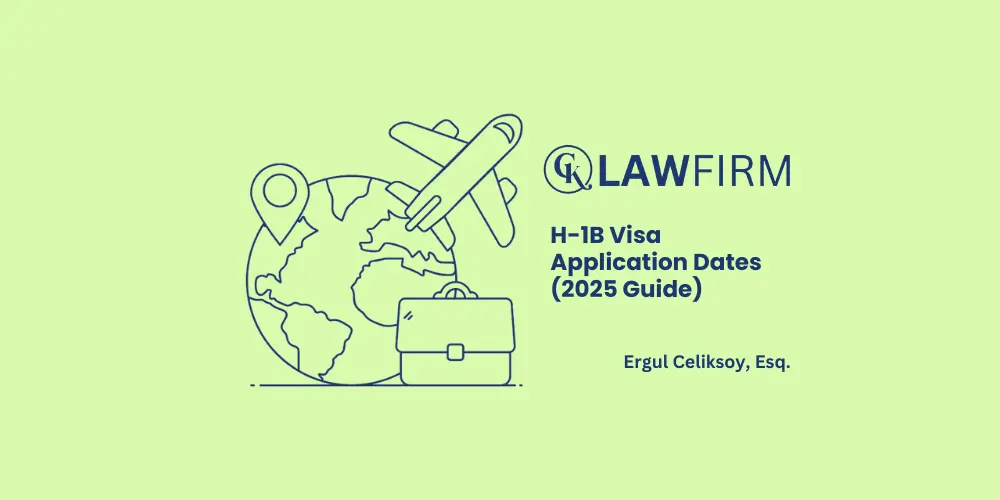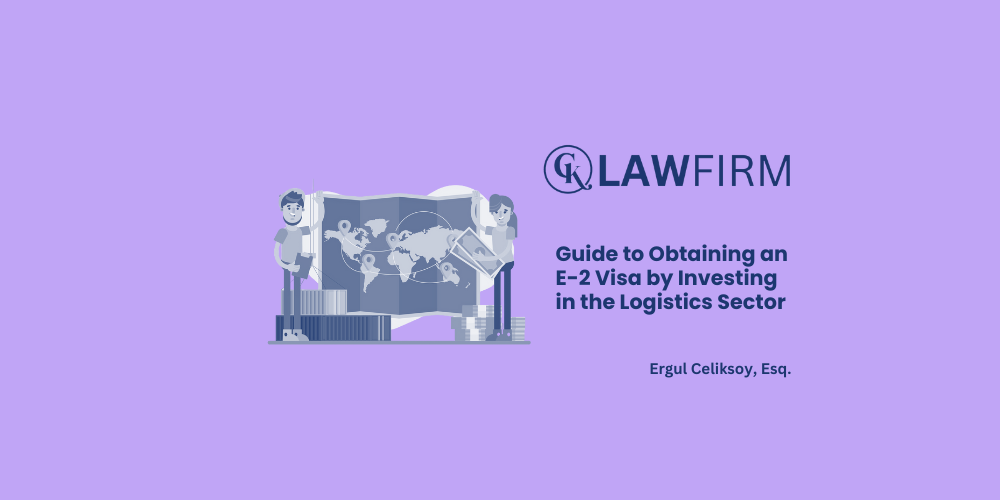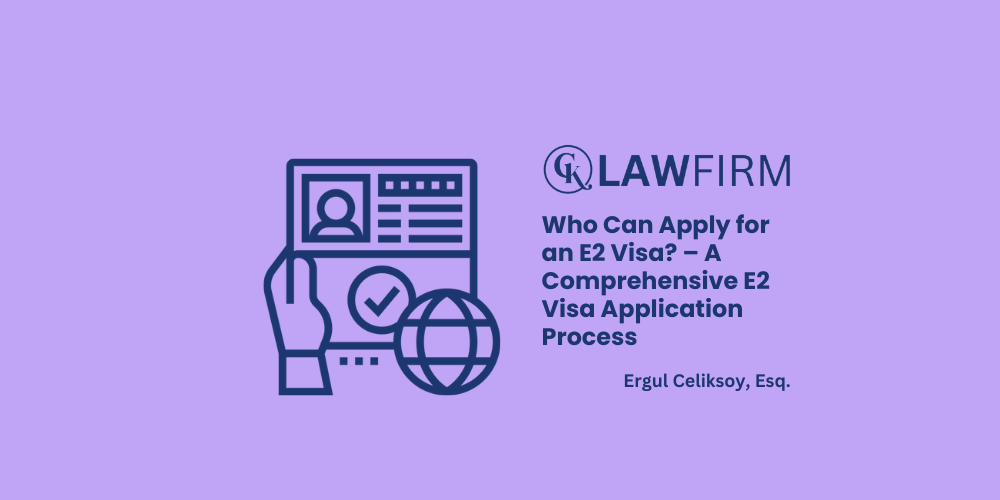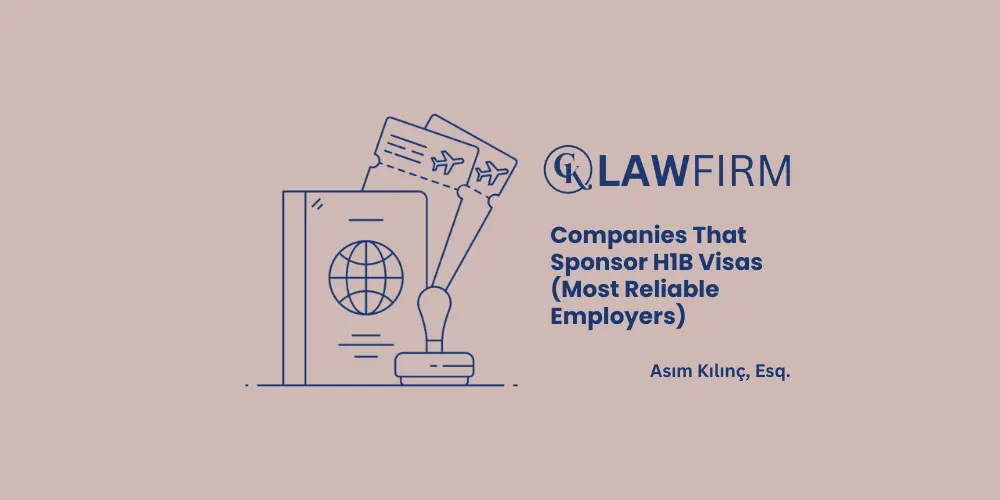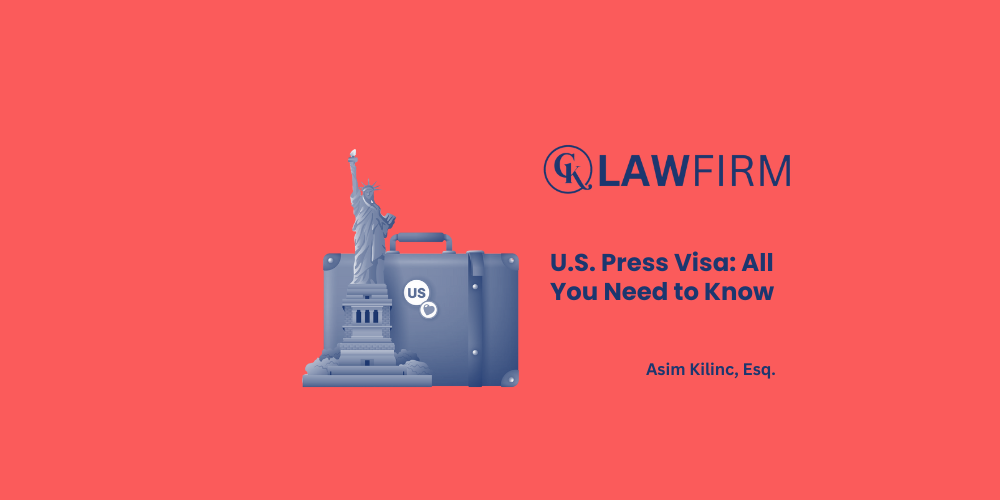Schedule an Appointment with Our Attorneys Now
By Ergul Celiksoy, Immigration Attorney at CK Law Firm
The H-1B visa offers a unique opportunity for Turkish professionals seeking to work in the United States. However, the application process for this visa requires detailed planning and accurate information. In this article, I cover essential topics related to H-1B visa application dates, including:
- What is the H-1B visa, and who is eligible to apply?
- 2025 H-1B Visa Application Dates
- H-1B Visa Fees
- How long does it take to get an H-1B visa?
- H-1B Visa Requirements
If you have additional questions beyond these topics, feel free to reach out through the comments section of this blog or the official CK Law Firm website. For personalized inquiries and consultancy services, you can also connect with me on LinkedIn.
What is the H-1B Visa, and Who is Eligible to Apply?
The H-1B visa is a work visa granted to foreign professionals seeking to work in specialized occupations in the United States. This visa is specifically designed for individuals specializing in fields such as technology, engineering, finance, and healthcare. So, who is eligible to apply for an H-1B visa?
- Educational Requirement: Applicants must hold at least a bachelor’s degree or its equivalent in education or experience.
- Job Offer: You cannot apply for this visa independently. An offer of employment from a U.S.-based company is required.
- Specialized Fields: The H-1B visa is not open to all professions. Applicants must have expertise in fields designated by USCIS (United States Citizenship and Immigration Services).
What is USCIS?
USCIS stands for “U.S. Citizenship and Immigration Services,” the agency responsible for managing H-1B visa applications. Your application’s success largely depends on meeting the eligibility criteria set by this agency. For this reason, it is crucial for every professional applying for an H-1B visa to thoroughly review the information and guidelines provided by USCIS.
2025 H-1B Visa Application Dates
Applications for the H-1B visa follow a specific timeline each year. While the official application dates for 2025 have not yet been announced, the general process typically unfolds as follows:
- Early April Start: USCIS usually opens the application process during the first week of April.
- Quota Filling Period: The H-1B visa cap often fills within a few days, depending on the volume of applications. Submitting your application as early as possible is strongly recommended.
- No Official Deadline: There is no fixed deadline for submitting applications. Therefore, it is crucial to file your application as soon as the process begins.
Professionals intending to apply for the H-1B visa should ensure they are fully prepared before the application window opens. Completing all required documents in advance will help your application process proceed smoothly and efficiently.
H-1B Visa Fees
The H-1B visa fees are a critical aspect of the application process. Being financially prepared in advance can help you avoid any unexpected challenges. Here are the key costs associated with the H-1B visa application:
- Application Fee: $460 (the basic fee for the H-1B application)
- Anti-Fraud Fee: $500 (aimed at preventing fraudulent applications)
- Premium Processing Fee (Optional): $2,500 (ensures a decision within 15 days)
- Education and Workforce Fee: $750–$1,500 (varies based on the size of the employer and is typically paid by the employer)
Understanding these costs will allow applicants and employers to budget effectively for the H-1B visa process.
How Long Does it Take to Get an H-1B Visa?
Once you’ve submitted your application, the waiting period begins—often filled with anticipation. Many professionals start asking, “How long does it take to get an H-1B visa?” The typical timeline is as follows:
- Standard Processing Time: Applications are generally processed within 3 to 6 months.
- Expedited Processing: By paying an additional fee for premium processing, you can receive a decision within 15 days.
- Request for Additional Evidence (RFE): If USCIS requests further documentation, it may extend the timeline.
To ensure a smooth process, it’s essential to be well-prepared before the application period begins. For additional guidance, check out our article, “H1B Visa: A Special Guide for Those Who Want to Work in America” before starting your application journey.
H-1B Visa Requirements
The H-1B visa is not suitable for everyone, which is why understanding the H-1B visa requirements is crucial before applying. Candidates who meet these criteria can confidently submit their applications. Key requirements include:
- Educational Qualifications: Applicants must meet the required education level.
- Proof of Expertise: Documentation of your specialized skills is necessary.
- Job Offer: A valid job offer from a U.S.-based employer is mandatory.
Candidates who fulfill these requirements can apply and await the results. Successful applicants often have the opportunity to move to the U.S. with their families. While the process can be challenging, its focus on specialized professionals increases the likelihood of approval, making it a highly attainable goal for eligible individuals.
Application Tips and Recommendations
To complete the H-1B visa application process with minimal difficulty, consider the following essential tips:
- Prepare All Required Documents: Ensure your job offer letter, academic credentials, and professional certifications are complete and accurate.
- Apply Early: Since the visa cap fills quickly, submit your application as early as possible.
- Seek Expert Support: Working with an immigration attorney can simplify the process and improve your chances of success.
If you are planning to apply for an H-1B visa, feel free to reach out to us. You can ask your questions in the comments section below this article or message me directly on LinkedIn. Stay prepared before the application window opens by contacting us at any time for guidance and support.
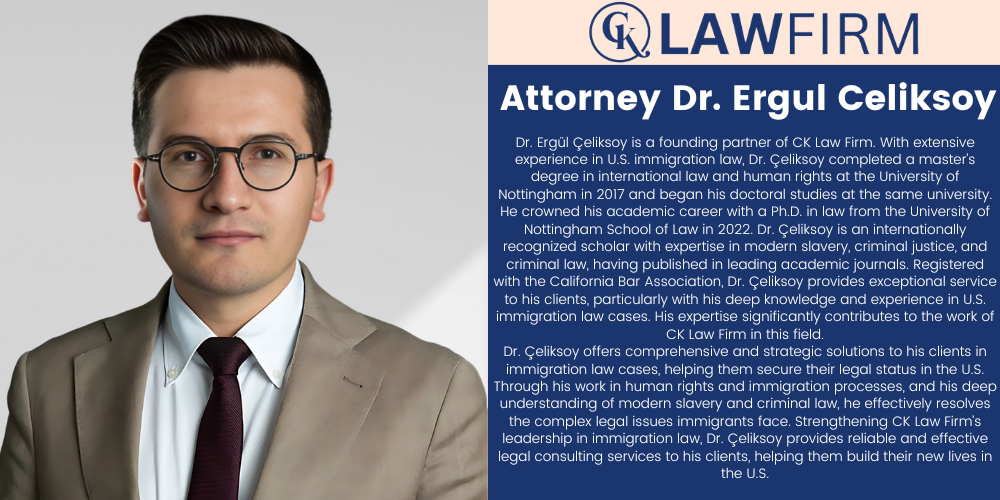
By Ergul Celiksoy, Immigration Attorney at CK Law Firm
The E-2 visa is one of the most advantageous visas available for investors in the United States. This visa allows citizens of countries with a trade agreement with the U.S. to establish or manage a business in the U.S. by making a certain amount of investment. The flexible structure of the E-2 visa offers significant opportunities for those considering investing in the logistics sector. In this article, we will explore the details of the E-2 visa:
- What is the E-2 Visa?
- Why the Logistics Sector?
- What Are the Requirements for Obtaining an E-2 Visa in the Logistics Sector?
- The E-2 Visa Application Process
- Differences Between Applying for an E-2 Visa from Turkey or the U.S.
If you have any other questions related to this topic, feel free to leave a comment at the end of this article, send me a message directly on LinkedIn, or contact me through the website of CK Law Firm, where I am a co-founder!
What is the E-2 Visa?
The E-2 visa is a type of visa available to investors who want to establish or manage a business in the U.S. It requires making an investment that contributes to the U.S. economy with a certain amount of capital. This visa type allows the applicant and their family to live and work in the U.S. However, as a non-immigrant visa, it does not grant permanent residency (Green Card). Nevertheless, as long as the business continues, the E-2 visa can be renewed indefinitely.
Why the Logistics Sector?
The logistics sector in the U.S. is a rapidly growing area offering significant opportunities to investors. At a time when global trade is increasing, e-commerce is accelerating, and supply chains are becoming more complex, investing in the logistics sector can be highly profitable. Logistics not only involves transportation but also includes warehousing, inventory management, shipping, and supply chain optimization. This wide range of services allows investors to enter the sector with different business models.
What Are the Requirements for Obtaining an E-2 Visa in the Logistics Sector?
Investment Amount and Business Model:
The amount of investment in the logistics sector can vary depending on the type of business. Generally, no specific investment amount is required for the E-2 visa. However, the investment is expected to be “substantial.” A minimum investment amount between $100,000 and $200,000 is recommended, depending on the type and scale of the business. The investment must support the sustainable operation of the business and demonstrate profitability potential.Common investment models in the logistics sector include:
- Starting a transportation company
- Establishing warehousing and distribution centers
- Offering supply chain management services
Investment Must Be at Risk:
To obtain an E-2 visa, the investment must be “at risk.” This means the money invested must be tied to the business, and there must be a risk of losing the capital if the business is not successful. This criterion demonstrates the investor’s commitment to developing their business.
Business Sustainability:
The business you establish in the logistics sector must be sustainable. It should not only support the investor and their family but also contribute to the U.S. economy. The business’s potential for growth, job creation, and economic benefit to the U.S. will strengthen the visa application.
The E-2 Visa Application Process
- Eligibility by Nationality: To apply for an E-2 visa, you must be a citizen of a country with a trade agreement with the U.S. Turkey is among the countries eligible to apply for an E-2 visa.
- Business Plan Preparation: Presenting a detailed and realistic business plan is crucial for E-2 visa applications. You must provide a comprehensive business plan showing how your investment in the logistics sector will operate, its goals, profitability projections, and its contribution to the U.S. economy. Your business plan should convince the visa officer of the sustainability and credibility of your business and investment.
- Visa Application and Interview: After preparing the necessary documents, you can apply for the visa through the U.S. Consulate. During the E-2 visa application, an interview is conducted, focusing on the sustainability of your business model and the legitimacy of your investment. It is essential to thoroughly understand your business plan and model before attending the interview.
Differences Between Applying for an E-2 Visa from Turkey or the U.S.
The E-2 investor visa can be applied for both from within the U.S. and from U.S. Consulates abroad. However, there are important differences in terms of process and outcomes depending on where the application is submitted. Understanding these differences can help shape the strategy for investors considering applying from Turkey or the U.S.
Application Location: Consular Application from Turkey vs. Change of Status in the U.S.
From Turkey:
Investors residing in Turkey apply for the E-2 visa through the U.S. Embassy or Consulate. In consular applications, the process is primarily evaluated by consular officers, and if approved, the investor is directly granted the E-2 visa, allowing entry to the U.S. to manage their investment.
Advantages:
- Entry to the U.S.: Once you are granted an E-2 visa from the Consulate, you can enter the U.S. and stay throughout the visa validity period.
- Visa Duration: For Turkish citizens, the visa is typically granted for 5 years and can be renewed.
- Ease of Travel: With the E-2 visa, you can leave the U.S. and re-enter freely during the visa’s validity.
Disadvantages:
- Interview Requirement: A face-to-face interview at the U.S. Consulate is mandatory, which can be a stressful process.
- Initial Investment: A significant portion of the investment must be made before entering the U.S., which can complicate business management.
From the U.S.:
Investors already in the U.S. on a different visa (such as a tourist visa) can apply to change their status to an E-2 visa through the U.S. Citizenship and Immigration Services (USCIS).
Advantages:
- No Interview: In most cases, no interview is required for USCIS applications.
- Staying in the U.S.: Once approved, you can remain in the U.S. and manage your business.
- Starting the Business: Being physically in the U.S. can make it easier to start and manage the business.
Disadvantages:
Travel Restrictions: Changing status does not grant you a visa. If you leave the U.S., your E-2 status ends, and you will need to apply for an E-2 visa at a U.S. Consulate.
No Visa Issuance: The change of status process only provides a legal status change, not a visa. To travel outside the U.S., you will need to obtain a consular visa.
Processing Time:
From Turkey: Consular applications typically result faster, usually taking 2-3 months, depending on the consulate’s workload.
From the U.S.: Applications for status change take longer, usually 4-6 months. However, for an additional fee, premium processing can provide results within 15 days.
Visa Duration and Renewal:
From Turkey: For Turkish citizens, the visa is typically issued for 5 years. As long as the business continues, the visa can be renewed, and the investor and their family can leave and re-enter the U.S.
From the U.S.: A status change to E-2 typically grants a 2-year stay. Before this period ends, you can apply to USCIS for an extension. However, this status does not allow for travel outside the U.S. without first applying for a visa at a U.S. Consulate.
Family Members’ Status:
From Turkey: Family members can apply for an E-2 visa along with the investor. The spouse can apply for work authorization in the U.S., and children can attend school.
From the U.S.: Family members can apply for a status change along with the investor. The spouse can apply for a work permit, and children can continue their education. However, if family members wish to travel outside the U.S., they must obtain a visa from the U.S. Consulate.
Conclusion
Investing in the logistics sector to obtain an E-2 visa presents a significant opportunity for investors aiming to establish a business in the U.S. The size of the investment, the sustainability of the business, and its contribution to the U.S. economy are key factors in the application process. The rapid growth and demand in the logistics sector make investment in this area attractive, while the E-2 visa serves as a supportive tool in this process.
If you are considering investing in the U.S. logistics sector, CK Law Firm can offer you professional support throughout your E-2 visa application process. For professional assistance, detailed information, and consultancy services, feel free to reach out to us at cklawfirm.org, via email at info@cklawfirm.org, or through LinkedIn.
Who is Attorney Ergül Çeliksoy?
Attorney Dr. Ergül Çeliksoy is a founding partner of CK Law Firm and also serves as an Assistant Professor of Law at the University of Nottingham. With extensive experience in U.S. immigration law, Dr. Çeliksoy completed a Master’s degree in international law and human rights law at the University of Nottingham in 2017, followed by a Ph.D. at the same university. His Ph.D., completed in 2022 at the University of Nottingham School of Law, marked a significant milestone in his academic career. Dr. Çeliksoy has published extensively in leading academic journals and is internationally recognized for his expertise in modern slavery, criminal justice, and criminal law. As a member of the California Bar, Dr. Çeliksoy offers exceptional service to his clients, particularly in U.S. immigration law cases. His expertise and experience in immigration law significantly contribute to CK Law Firm’s work in this area.
Dr. Çeliksoy provides comprehensive and strategic solutions to his clients in immigration law cases, helping secure their legal status in the U.S. His work on human rights and immigration processes, particularly in modern slavery and criminal law, effectively addresses the complex legal issues immigrants face. Dr. Çeliksoy reinforces CK Law Firm’s leadership in immigration law by offering reliable and effective legal consulting services to his clients, helping them build new lives in the United States.
By Ergul Celiksoy, Immigration Attorney at CK Law Firm
The E2 Visa is designed for entrepreneurs who wish to start a business or invest in an existing company within the United States. By meeting specific criteria, these investors and business owners can relocate their careers and lifestyles to the U.S. under the E2 program. Due to a bilateral treaty between the U.S. and various countries, including Türkiye, certain nationals are eligible to apply for an E2 Investor Visa. In this guide, we’ll explore the following topics with E2 visa application process:
- Overview of the E2 Visa
- Who Is Eligible to Apply for an E2 Visa?
- How Does the E2 Visa Application Process Work?
- What Rights Does the E2 Visa Offer in the United States?
- Is It Possible to Transition from an E2 Visa to a Green Card?
- Frequently Asked Questions
These highlights form our comprehensive look at the E2 Visa application process. If you have any additional questions related to the E2 Visa, feel free to reach out through our official website. For more personalized inquiries, you’re also welcome to connect with me on LinkedIn.

Overview of the E2 Visa
E2 is classified as a non-immigrant status, yet it grants you the opportunity to live in the United States for a set period and establish your own business. In other words, if you’ve always envisioned starting a new venture—or acquiring an existing one—in the U.S., the E2 Investor Visa can make that dream a reality. This visa allows you to invest in the American market, manage your enterprise, and even relocate with your family for a fresh start in the U.S.
Imagine opening a restaurant or purchasing a thriving business while seamlessly transitioning your life overseas. Sounds exciting, right? To turn that excitement into reality, it’s crucial to navigate your E2 Visa application carefully and ensure you meet all the eligibility requirements. Let’s explore whether you qualify for this opportunity.
Who Is Eligible to Apply for an E2 Visa?
Wondering “Who can apply for an E2 Visa?” The first step is determining whether your nationality is on the list of countries that hold a commercial treaty with the United States. Not all nationalities qualify for the E2 Visa, so verifying your eligibility is essential. To learn more about which citizens can apply, you can consult the official U.S. Department of State resources or our dedicated article on Can You Obtain U.S. Citizenship Through an E2 Visa?
However, merely having the correct citizenship isn’t enough. To submit a successful E2 Visa application, you’ll also need sufficient capital and a viable business model capable of generating revenue and employment opportunities. This could range from a local café to a tech startup, as long as your funds are invested in an “active” and “at-risk” venture, rather than a passive endeavor like real estate purchases for personal use.

How Does the E2 Visa Application Process Work?
The E2 Visa Application Process involves a series of steps that must be followed diligently. Below is an overview to guide you along your path:
- Preparation and Planning
- Decide which industry you intend to pursue.
- Determine how much capital you’re willing to invest.
- Develop a comprehensive business plan.
- Establishing or Acquiring a Business
- You may start a brand-new company or purchase an existing business.
- The key requirement is an active investment, meaning funds must be at risk and directed toward a functioning enterprise (passive investments in real estate, for example, do not qualify).
- Gathering Application Documents
- Prepare financial records, a valid passport, your business plan, company documentation, and all other relevant paperwork.
- Consulting with an E2 Visa attorney can streamline the application process, helping you submit a precise and well-organized file.
- Consular Processing
- After compiling all documentation, you submit your application to the appropriate U.S. Consulate or the USCIS (U.S. Citizenship and Immigration Services).
- You then schedule an E2 Investor Visa Interview, where you’ll discuss the authenticity of your investment and the potential benefits it brings to the U.S. economy.
- Outcome and Approval
- A successful E2 Visa application grants you the opportunity to embark on a new chapter in the United States.
- If your application is denied, you have the option to address the deficiencies and reapply, potentially improving your chances of approval on a subsequent attempt.
What Rights Does the E2 Visa Offer in the United States?
Now for the exciting part: what benefits do you gain once you enter the United States on an E2 Visa?
- Freedom to Manage Your Business: By investing in your own enterprise, you can actively oversee its operations and take full advantage of business opportunities across the U.S. market.
- Bring Your Family Along: Your spouse is eligible to apply for work authorization, and any unmarried children under the age of 21 can enroll in U.S. schools. It’s a chance for your family to explore a new culture and lifestyle together.
- Unlimited Entry and Exit: As long as your E2 Visa remains valid, you can travel to and from the United States whenever you need. This flexibility allows you to keep up with responsibilities in your home country while still managing your U.S.-based business.
Of course, retaining these privileges depends on keeping your investment active and proving that your business continues to operate productively. Remember, demonstrating your ongoing contribution to the U.S. economy is essential at every stage.

Is It Possible to Transition from an E2 Visa to a Green Card?
E2 is classified as a non-immigrant visa status, which means it does not automatically grant you a Green Card. Does that mean obtaining permanent residency is off the table? Not at all. Here are two alternative paths:
- EB-5 Investor Program: If you have the capacity to increase your capital to a higher threshold (typically USD 800,000 or USD 1,050,000, depending on the region) and meet specific job creation requirements, you may be eligible to apply for a Green Card through the EB-5 program.
- Other Visa Categories: Employer sponsorship (EB-2, EB-3, etc.) or family-based petitions can also offer long-term “permanent residence” solutions, depending on your qualifications and personal circumstances.
Each of these pathways has distinct prerequisites and procedures, so creating a well-informed strategy—often with professional guidance—can significantly simplify your journey.
Frequently Asked Questions
The duration generally depends on the treaty agreement between the United States and your home country. In many cases, it can be valid for up to five years. As long as your investment remains active, you can apply for extensions repeatedly.
If you hold an E2 Investor Visa, your spouse can apply for work authorization and your children can attend U.S. schools—often with reduced or no tuition costs if they enroll in public institutions.
Absolutely. You can correct the issues that led to the denial and submit a new application. It’s generally advised to seek professional guidance during your initial E2 Visa process to boost your chances of approval.
The E2 Visa only permits you to work for the business in which you’ve invested or have ownership. However, your spouse is free to work in any qualifying position once they secure the appropriate work authorization.
While there is no fixed minimum amount, your investment must be considered “substantial,” meaning it should be large enough to ensure the viability of the enterprise. Most applicants invest at least USD 100,000 or more, as this level of funding is commonly viewed more favorably.
The E2 Visa offers an exciting opportunity to turn your aspirations in the United States into reality. We’ve covered the key aspects in this E2 Visa application guide, but remember you’re always welcome to reach out through the CK Law official website for further assistance. If you’d like a more personalized discussion, feel free to connect with me on LinkedIn at any time.
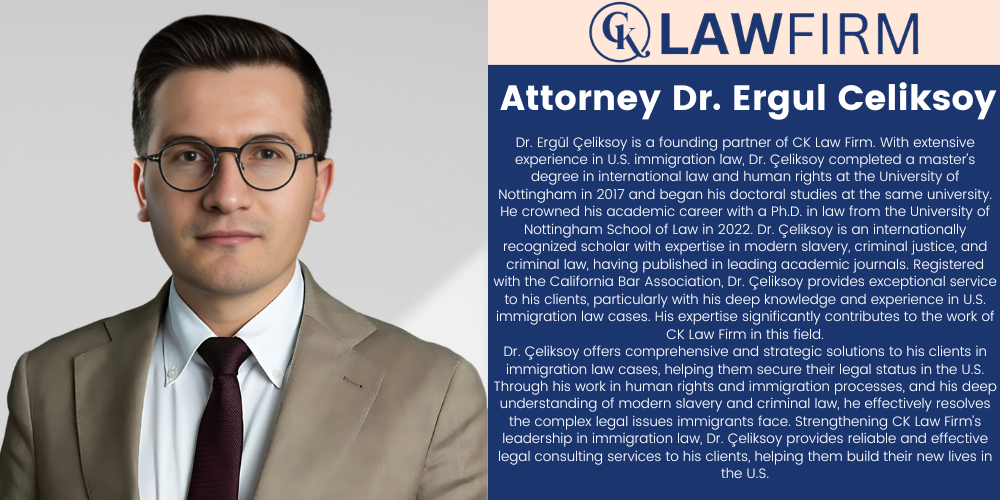
By Ergul Celiksoy, Immigration Attorney at CK Law Firm
For individuals with extraordinary abilities who wish to immigrate to the United States, the EB-1A visa is one of the most prestigious and direct routes. However, before applying for this visa, it’s essential to understand the processing time involved. In this article, I will answer some of the most common questions regarding the processing time of the EB-1A Extraordinary Ability visa. By reading this post, you’ll find answers to the following questions:
- What is the EB-1A Visa?
- Advantages of the EB-1A Visa
- EB-1A Visa Processing Time
- Factors Affecting EB-1A Processing Time
- Important Considerations During the EB-1A Application Process
If you have questions about other visa types like the EB-1A, feel free to reach out via the comments section at the bottom of this article, message me directly on LinkedIn, or contact me through our CK Law Firm Immigration Law website.
What is the EB-1A Visa?
The EB-1A is a U.S. immigrant visa designed for individuals with extraordinary abilities in science, arts, education, business, or athletics. Unlike many other visa categories, the EB-1A visa does not require a job offer or employer sponsorship. Instead, applicants must demonstrate and provide evidence of their exceptional achievements in their field. The EB-1A, also known as the “extraordinary ability” visa, is one of the fastest ways to obtain permanent residency (Green Card) in the United States.
Advantages of the EB-1A Visa
The EB-1A visa offers several benefits compared to other immigrant visas:
- No Job Offer Required: The EB-1A visa does not require a job offer, allowing you to apply independently without employer sponsorship.
- Direct Green Card: The EB-1A visa is one of the fastest routes to obtaining permanent residency in the United States.
- High Approval Rate: EB-1A applications have a high approval rate as long as you can prove your extraordinary abilities.
EB-1A Visa Processing Time
The processing time for the EB-1A visa begins once your application is submitted to USCIS. The process typically involves several stages:
- Preparation and Submission of the Application:
The EB-1A visa application requires careful preparation. Submitting all necessary documents accurately and completely can directly impact the review time. This stage of the application process, including gathering documents and preparing the file, can take between 2 to 4 months. - USCIS Processing Time:
After USCIS receives your application, it usually takes between 8 to 14 months to review and decide on the case. This time frame can vary depending on the complexity of the application, USCIS’s processing volume, and other factors. However, it is possible for this period to be extended, especially if a Request for Evidence (RFE) is issued, which can further delay processing. - Premium Processing Option:
If you want your EB-1A visa application to be processed faster, you can consider the Premium Processing option. For an additional fee, this service ensures that USCIS will review your application within 15 days. However, Premium Processing only speeds up the process and does not guarantee approval.
Factors Affecting EB-1A Processing Time
Several factors can influence the processing time for the EB-1A visa. These include:
- Application Complexity: If your application includes extensive documentation to prove your extraordinary abilities, USCIS may take longer to review it.
- USCIS Processing Volume: The volume of applications USCIS handles during a given period can affect processing times. Factors like pandemics, natural disasters, or other extraordinary events can lead to significant delays in processing times.
- Requests for Evidence (RFEs): USCIS may issue a Request for Evidence after reviewing your application, which can significantly delay the process. Responding promptly and thoroughly to RFEs is critical to expediting the process.
Important Considerations During the EB-1A Application Process
When applying for the EB-1A visa, there are some essential points to keep in mind:
- Prepare Your Application Completely:
Before starting the application process, ensure all necessary documents are ready. The EB-1A application requires a detailed preparation process, and careful management of this process can lead to faster processing of your application. - Pay Attention to Time Management:
The EB-1A application process can be time-consuming. Keeping track of the application process and considering acceleration options when necessary can help you manage the process more effectively. - Submit Strong Recommendation Letters:
When applying for the EB-1A visa, obtaining strong recommendation letters from recognized individuals in your field can increase your chances of success. These letters should emphasize your extraordinary abilities and contributions to your field. Strong and reputable references can make a significant difference in the USCIS review process.
Conclusion
The EB-1A visa is one of the most prestigious ways for individuals with extraordinary abilities to immigrate to the United States. Processing times can vary depending on the preparation of the application, USCIS’s processing volume, and other factors. However, it is possible to accelerate the process and increase your chances of success by taking the right steps.
If you wish, you can reach me via the CK Law Firm website at cklawfirm.org, by email at info@cklawfirm.org, or directly on LinkedIn to find out if you are eligible for the EB-1A visa through our free consultation service. All you need to do is send us your CV. We will review your CV and get back to you within 24 hours.
Who is Attorney Ergül Çeliksoy?
Attorney Dr. Ergül Çeliksoy is the co-founder of CK Law Firm and also serves as an Assistant Professor of Law at the University of Nottingham. With extensive experience in U.S. immigration law, Dr. Çeliksoy completed his master’s degree in international law and human rights at the University of Nottingham in 2017 before beginning his Ph.D. studies at the same university. Dr. Çeliksoy earned his Ph.D. in law at the University of Nottingham School of Law in 2022, marking a significant milestone in his academic career. He is a recognized academician with expertise in modern slavery, criminal justice, and criminal law, with publications in leading academic journals.
As a member of the California Bar, Dr. Çeliksoy provides outstanding service to his clients, particularly in U.S. immigration law cases. His knowledge and experience in immigration law are valuable assets to CK Law Firm’s practice in this field. Dr. Çeliksoy offers comprehensive and strategic solutions to his clients in immigration law cases, helping them secure their legal status in the U.S. His deep understanding of human rights and immigration processes, along with his expertise in modern slavery and criminal law, enables him to effectively address the complex legal issues faced by immigrants. By offering reliable and effective legal counseling services, Dr. Çeliksoy helps his clients build new lives in the U.S.
Asım Kılınç, Immigration Attorney, CK Law Firm
The H1B visa is a type of visa that allows foreign professionals to temporarily work and reside in the United States. Through this visa, many professionals gain the opportunity to work and grow in their respective fields on a global scale. However, it is crucial for professionals to make careful choices when selecting companies that sponsor H1B visas. In this article, you will find details addressing this point. Along with listing companies that sponsor H1B visas, I will also cover the following topics:
- What is the H-1B Visa?
- Who Can Apply for the H-1B Visa?
- H-1B Visa Occupations
- Companies That Sponsor H-1B Visas
- Transitioning from H-1B Visa to a Green Card
If you have any additional questions about the H-1B visa, feel free to reach out to us through the comments section of this blog or via the CK Law Firm Immigration Attorneys Website. For personal inquiries and consultation services, you can also contact me directly on LinkedIn.
What is the H-1B Visa?
The H-1B visa is a type of visa that allows foreign professionals to work in the United States in specialized fields. To qualify for this visa, individuals must possess expertise in areas such as technology, engineering, finance, academia, and medicine. Here are the key features of the H-1B visa:
- Validity Period: The H-1B visa is initially granted for a period of 3 years and can be extended up to a total of 6 years.
- Green Card Connection: The H-1B visa also provides a pathway to apply for a Green Card, granting permanent residency in the United States.
- Family Inclusion: One of the key advantages of this visa is the ability to bring your family members with you. This means you can embark on your professional journey in the U.S. while staying together with your loved ones.
Who Can Apply for the H-1B Visa?
I often hear the question, “Who is eligible for an H-1B visa?” To obtain an US H1B visa you must meet the criteria established by USCIS (U.S. Citizenship and Immigration Services). These criteria primarily include the following:
- Specialty Occupations: The H-1B visa is designed for individuals working in fields that require specialized expertise. Examples include software development, data science, medicine, and engineering.
- Educational Requirements: Applicants must hold at least a bachelor’s degree or possess equivalent professional experience in their field.
- U.S. Employer Sponsorship: To apply for an H-1B visa, you must have a job offer from a U.S.-based company willing to sponsor your application.
H-1B Visa Occupations
The H-1B visa primarily targets professionals working in science, technology, engineering, and mathematics (STEM) fields. However, it is not limited to these areas. Here are some common H-1B visa occupations:
- Software Developers and Data Scientists: The U.S. technology sector is one of the largest users of H-1B visas, making it a popular option for professionals in these fields.
- Engineers: Fields such as electrical, mechanical, and chemical engineering often see high demand for H-1B visa applicants.
- Academics and Researchers: This visa is also suitable for individuals specializing in academic fields like medicine and natural sciences.
- Finance Professionals: Roles such as financial analysts and risk managers are also eligible for H-1B visa applications.
These professions play a critical role in the economic and technological development of the United States, making them priority groups for the H-1B visa. Additionally, professionals applying from these fields often have a higher likelihood of their visa applications being approved.
Companies That Sponsor H-1B Visas
Firms that H1B visa sponsorship jobs are often among the leading companies in the United States. These organizations typically post job openings or extend job offers to qualified professionals. Companies that sponsor H-1B visas are commonly found in sectors like technology, finance, and engineering. Here are some of the major companies that sponsor H-1B visas:
- Technology Giants: Companies like Google, Microsoft, Amazon, and Apple lead the way in sponsoring H-1B visas. They offer job opportunities for experts in fields such as software development and data science.
- Financial Institutions: Firms such as JP Morgan and Goldman Sachs employ professionals specializing in finance and analytics.
- Engineering Companies: Organizations like Intel and Qualcomm seek experts in hardware development and related engineering disciplines.
H-1B Vizesi ile Green Card’a Geçiş
The H1B visa serves as a stepping stone for individuals seeking permanent residency in the United States. To apply for a Green Card through an H1B visa, the company sponsoring your H1B visa must also sponsor your Green Card process. Alternatively, H1B visa holders can apply for a Green Card under the EB-2 or EB-3 visa categories.
Another option provided by USCIS is obtaining permanent residency through the Labor Certification (PERM) process. However, this method may take a longer time to complete.
In this article, along with the information provided about companies that sponsor H1B visas, if you need support during your H1B visa process, you can always reach out to us through the CK Law Firm Website or via the comments section. Additionally, for specific inquiries or professional consultation, feel free to contact me directly on LinkedIn.
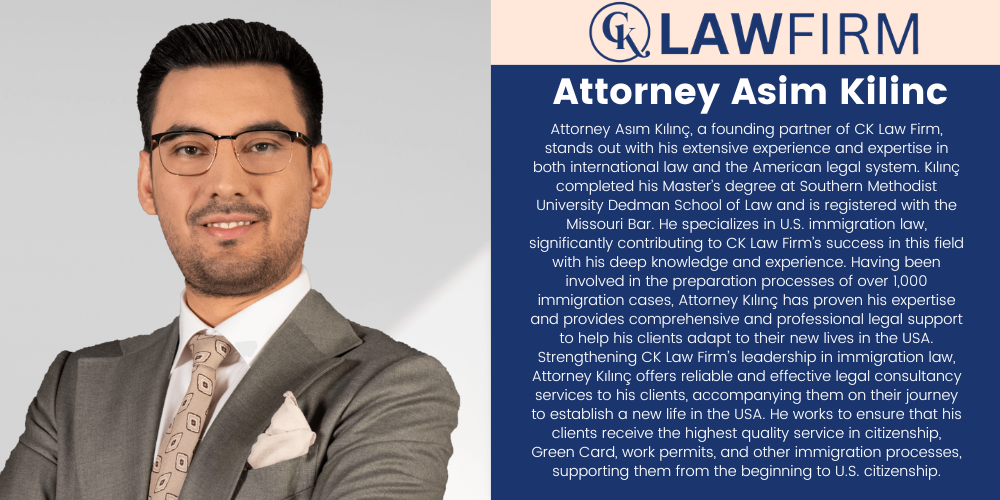
By Asim Kilinc, Immigration Attorney at CK Law Firm
For foreign nationals looking to engage in journalism, media, or other press activities in the United States, the U.S. Press Visa, or I Visa, is the ideal option. This visa is aimed at media professionals and journalists who meet specific requirements and need to conduct short-term press-related duties in the U.S. In this article, we’ll cover the application process, eligibility criteria, and other important details regarding the I Visa.
- What is the U.S. Press Visa?
- Who Can Apply for the U.S. Press Visa?
- What Are the Requirements for the U.S. Press Visa?
- U.S. Press Visa Application Process
- What Activities Can Be Conducted with the U.S. Press Visa?
- How Long Can I Stay in the U.S. with a Press Visa?
- Can I Apply for a Green Card with the U.S. Press Visa?
For additional questions, feel free to reach out through the comments section of this post, send me a message directly on LinkedIn, or contact me through the website of CK Law Firm, an Immigration Law firm I co-founded.
What is the U.S. Press Visa?
The U.S. Press Visa is a special visa issued to individuals traveling to the United States to perform press-related work temporarily. Journalists, filmmakers, reporters, photographers, and other media workers can apply for this visa. With this visa, you can work in the U.S. for a specified period while continuing your press activities.
Who Can Apply for the U.S. Press Visa?
The U.S. Press Visa (I Visa) is available to foreign media personnel engaging in temporary press and media activities in the United States. Those eligible to apply include:
- Journalists: Professional journalists who will gather news, conduct interviews, and report on events in the U.S.
- Filmmakers: Producers, directors, and camera operators involved in non-commercial documentary or film projects.
- Reporters: Reporters working for international media outlets, reporting news or events from the U.S.
- Photojournalists: Professional photographers taking photos for news outlets.
- Editors and Writers: Individuals writing or editing content for newspapers, magazines, TV, or radio outlets.
- Technical Staff: Technicians providing necessary support for media organizations and working temporarily in the U.S.
Applicants must be full-time employees of a media organization, working on a temporary assignment in the U.S. Freelancers or those involved in commercial projects may not qualify for the I Visa.
What Are the Requirements for the U.S. Press Visa?
Applicants for the U.S. Press Visa must meet specific criteria:
- Media Professional: You must provide proof that you are employed in the media industry. This can include official documents showing you work for a newspaper, TV channel, magazine, or other media organization.
- Temporary Assignment: You must state that you are in the U.S. temporarily for press-related duties. The U.S. Press Visa cannot be used for permanent jobs or to settle in the U.S.
- Press Activities: You must demonstrate that the activities you will be conducting in the U.S. are related to journalism or media, such as news gathering, reporting, or filming.
- Full-Time Employment: Freelancers are generally not eligible for this visa. You must be employed as a full-time worker for a media organization.
U.S. Press Visa Application Process
Filling Out the DS-160 Form:
Like other U.S. visas, applicants for the Press Visa must complete the DS-160 form online. This form is the foundation of your application and includes your personal information.
Payment of Application Fee:
A specific fee must be paid during the application process, which may vary depending on the consulate.
Supporting Documents:
You will need to provide supporting documents such as your media ID, a letter from your employer, and proof of your work.
Interview Appointment:
You will be required to attend an interview at the U.S. consulate. During the interview, you will need to explain the press-related activities you will be conducting in the U.S. and provide accurate documentation.
Visa Approval:
Once your application is approved, you will receive your U.S. Press Visa along with your passport. The visa’s duration will depend on the length of your assignment and any applicable agreements.
What Activities Can Be Conducted with the U.S. Press Visa?
With the U.S. Press Visa, you can engage in specific media and journalism activities in the U.S., including:
- News Gathering and Reporting: Journalists and reporters can gather and report news in the U.S.
- Documentary or Film Production: The Press Visa allows you to participate in the production of documentaries or films, provided they are not for commercial purposes.
- International Broadcasting: You can carry out work on behalf of foreign media organizations operating in the U.S.
How Long Can I Stay in the U.S. with a Press Visa?
The Press Visa is a temporary visa, and your stay in the U.S. is limited to the duration of your assignment. You are generally expected to leave the U.S. once your assignment is completed. However, in some cases, you may apply for an extension and renew the visa.
Can I Apply for a Green Card with the U.S. Press Visa?
The U.S. Press Visa is a temporary work visa and does not provide a direct path to a Green Card.
Frequently Asked Questions
- How long does the U.S. Press Visa application take?
The application process can take several weeks. However, this may vary depending on consulate processing times. - Can I bring my family to the U.S. with a Press Visa?
Yes, Press Visa holders can bring their spouse and children under 21 to the U.S. A separate application is required for family members. - Can freelance journalists apply for the U.S. Press Visa?
Generally, freelance journalists are not eligible for the U.S. Press Visa. However, if you work for a specific media organization, you may be eligible.
Conclusion
The U.S. Press Visa is an ideal option for foreign journalists and media professionals who need to work temporarily in the U.S. By ensuring you submit the correct documentation and follow the application steps carefully, you can expedite the approval process. At CK Law Firm, we guide you through the visa application process, helping you take the correct steps. For professional support and detailed consultation, reach out to us via cklawfirm.org, info@cklawfirm.org, or LinkedIn.
Who is Attorney Asım Kılınç?
Attorney Asım Kılınç is the co-founder of CK Law Firm and is recognized for his expertise in immigration law and U.S. asylum applications. Kılınç completed his Master’s degree at Southern Methodist University Dedman School of Law and is a member of the Missouri Bar Association, with a focus on U.S. immigration law.
Attorney Kılınç’s extensive knowledge and experience in immigration law have significantly contributed to CK Law Firm’s success in this field. He has actively participated in the preparation of over 1,000 cases, demonstrating his expertise in this area. By providing comprehensive and professional legal support to his clients, he helps them adapt to their new lives in the U.S.
Attorney Kılınç is also well-versed in U.S. asylum applications. He meticulously guides his clients through the process and ensures they receive the best legal advice. He provides top-quality service to clients in matters of citizenship, Green Card, work permits, and other immigration processes, supporting them from start to finish on their journey to U.S. citizenship.
Attorney Asım Kılınç, who solidifies CK Law Firm’s leadership in immigration law and U.S. asylum applications, offers reliable and effective legal consultancy services to clients, assisting them in building a new life in the U.S.
Subscribe to Our Newsletter
Subscribe to our newsletter to stay informed about the latest announcements and articles written by our attorneys on U.S. immigration processes.
Aout Us
Our experienced lawyers at CK Law Firm offer effective solutions for those who want to make new beginnings in the USA. We facilitate and accelerate your immigration process by providing consultancy on all visa types.
Our Services
Visas
Business Green Card
Family Green Card
US Citizenship
Talent and Performance Visas
Work Visas
Investor and Trader Visas
Contact Us
+1 (972) 363- 96 89
info@cklawfirm.org
Address
2800 Regal Rd #102, Plano, TX 75075

All Rights Reserved by CK Law Firm.


